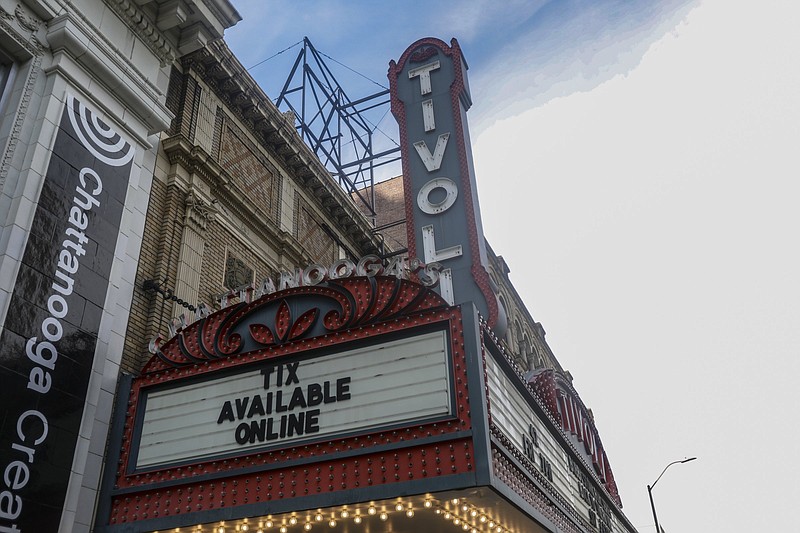Tivoli Foundation Executive Director Nick Wilkinson said his team of employees had been gearing up for Monday's opening of the application process for the national Shuttered Venue Operators Grant program for months.
"We were ready and wanted to be, if not first, then right there," he said.
The program was established by the Economic Aid to Hard-Hit Small Businesses, Nonprofits, and Venues Act, and amended by the American Rescue Plan Act. It includes more than $16 billion in grants to shuttered venues, to be administered by the Small Business Administration's Office of Disaster Assistance, and it will be allocated on a first-come, first-served basis spread over four tiers focused on which entities lost the most.
The Tivoli and Memorial Auditorium lost more than $10 million in revenue over the last 14 months, a number that represents about 70% of its annual income. All applicants were able to apply on Monday, according to the website's application. Entities who lost 90% or greater of revenue will get first priority followed by those who lost 70% or greater and then, in the third phase, those who lost 25% or greater.
"It opened at noon and we were done by about 1:30. The team was ready. This should be a huge help for all of us," Wilkinson said.
Chattanooga Presents Executive Director Carla Pritchard is hopeful that the program will help her recover some lost revenue caused by the pandemic and get her back on solid ground. That is, if she can overcome the glitches and actually complete the application that went online Monday.
Just signing into it has been a challenge.
"I have an appointment [Wednesday] to get help," she said.
Pritchard said she doesn't know the exact amount of revenue she has lost in the last year, but said it is in the hundreds of thousands, and said the money is much needed and that she has no idea how much of the $16 billion in the program she might qualify for.
"I have no expectation in terms of how much, but it would enable me to get on a very sure footing in terms of our programs. It sounds like a lot of money and it is, but it depends on how it is allocated and to how many."
The same is true for Chattanooga Theatre Centre Executive Director Rodney Van Valkenburg, who said the program could be a way "to get business up and running again. Even though we have been active, people think we have more employees than we have."
Van Valkenburg said the center has lost $400,000 in revenue during the pandemic and made its application as soon as possible on Monday. He said he believes, based on the questions asked, the organization should qualify.
According to the website, eligible applicants may qualify for grants equal to 45% of their gross earned revenue, with the maximum amount available for a single grant award of $10 million. A total of $2 billion is reserved for eligible applications with up to 50 full-time employees.
Eligible entities include:
* Live venue operators or promoters.
* Theatrical producers.
* Live performing arts organization operators.
* Museum operators.
* Motion picture theater operators (including owners).
* Talent representatives.
They must have been in operation as of Feb. 29, 2020, and venues or promoters who received a Paycheck Protection Program loan on or after Dec. 27, 2020, will have the Shuttered Venue Operators Grant reduced by the PPP loan amount.
Also according to the application website, grant amounts will reflect either of the following instances:
* For an eligible entity in operation on Jan. 1, 2019, grants will be for an amount equal to 45% of their 2019 gross earned revenue or $10 million, whichever is less.
* For an eligible entity that began operation after Jan . 1, 2019, grants will be for the average monthly gross earned revenue for each full month they were in operation during 2019 multiplied by six, or $10 million, whichever is less.
Also, funds may be used for specific expenses, which include:
* Payroll costs.
* Rent payments.
* Utility payments.
* Scheduled mortgage payments (not including prepayment of principal).
* Scheduled debt payments (not including prepayment of principal on any indebtedness incurred in the ordinary course of business prior to Feb. 15, 2020).
* Worker protection expenditures.
* Payments to independent contractors (not to exceed $100,000 in annual compensation for an individual employee of an independent contractor).
* Other ordinary and necessary business expenses, including maintenance costs.
* Administrative costs (including fees and licensing).
* State and local taxes and fees.
* Operating leases in effect as of Feb. 15, 2020.
* Insurance payments.
* Advertising, production transportation, and capital expenditures related to producing a theatrical or live performing arts production. (May not be primary use of funds).
And, grantees may not use award funds to:
* Buy real estate.
* Make payments on loans originated after Feb. 15, 2020.
* Make investments or loans.
* Make contributions or other payments to, or on behalf of, political parties, political committees, or candidates for election.
* Pay for any other use prohibited by the administrator.
In making the announcement in a news release, U.S. Sen. Bill Hagerty, R-Tenn., said, "Live performing arts is not just a hobby across Tennessee, it's a way of life along with many others in the tourism and hospitality industries, but the pandemic has taken an enormous toll. Starting today those that are eligible who need emergency assistance from this bipartisan program can apply and receive the help they need so we can ensure that our state's thriving creative industry fully recovers.
"My office is here to assist, and I encourage anyone with questions to reach out."
Contact Barry Courter at bcourter@timesfreepress.com or 423-757-6354.
